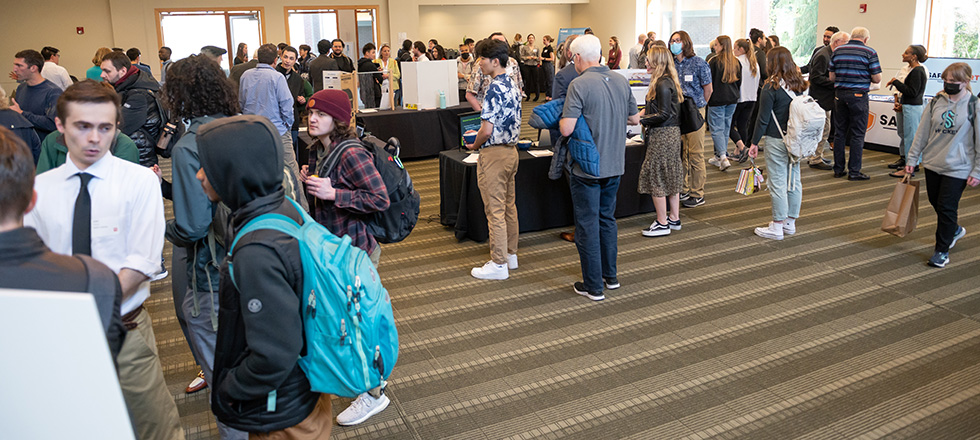
Sea, Sky, and Land(fill)
Seattle Pacific University held its 17th annual Social Venture Plan Competition (SVPC) Showcase on the afternoon of Wednesday, April 19, 2023. Student teams developed solutions to a wide variety of social problems, from restoring failing coral reefs, to reducing electronic waste in landfills, to collecting freshwater from thin air. Yes, these innovative ideas spanned sea, sky, and land. The Showcase event, the finale of the annual SVPC, occurred in Upper Gwinn Commons on the SPU campus.
One in eight people globally rely on coral reefs for their livelihood, and yet 90% of coral reefs may die within the next century. Team Nemo Institute proposed a site-based project in the Bahamas that would work toward coral reef restoration using 3D printing, ecotourism, and education for college students through study abroad trips. Their multi-pronged approach included a variety of income sources and could be extended to other coral ecosystems over time. The Nemo Institute team included senior Business Administration majors Austin Freeman and Justin Freeman; junior Ecology and Global Development Studies double major Elizabeth Horton; junior Business Administration major Hannah Miller; and junior Accounting and Business Administration double major Maddie Wright.
Three Honorable Mention prizes of $2,000 were also awarded:
This is the 17th year of SPU’s Social Venture Plan Competition. Eleven teams pitched their ideas at the Showcase event, comprising approximately 50 students. In the first round of the competition, 18 written business plans, representing nearly 100 students from five different schools, were reviewed and scored by community partners.
The Showcase Round was the finale of the Social Venture Plan Competition. In addition to the review of written business plans, earlier stages in the competition included a series of seminars on the basics of business plan writing as well as coaching sessions with knowledgeable businesspeople, nonprofit executives, and others. In all, over 110 community volunteers gave time as readers, instructors, coaches, and judges.
Retired social enterprise executive and long-time volunteer Sandy Gibb, who served as a reader, said “I am so glad that others agreed that the Nemo Institute was an excellent proposal. I'm truly sorry I wasn't there to see [them pitch] first-hand.”
Heidi Webster, a local businesswoman and volunteer judge for the Showcase did see the live pitches and commented, “I enjoyed judging — the students and businesses were amazing! I will look forward to next year.”
Financial sponsors of the SVPC include the Herbert B. Jones Foundation, the Scott and Kathleen Cummins Family Foundation, Tschetter Group, Northwest Center, Bellmont Cabinets, Eastlake Real Estate Partner, Highland Private Wealth Management, Pioneer Human Services, and Skills Inc. The competition is organized by the Center for Applied Learning (CAL) in the School of Business, Government, and Economics (SBGE) at SPU.
Photos by John Godek